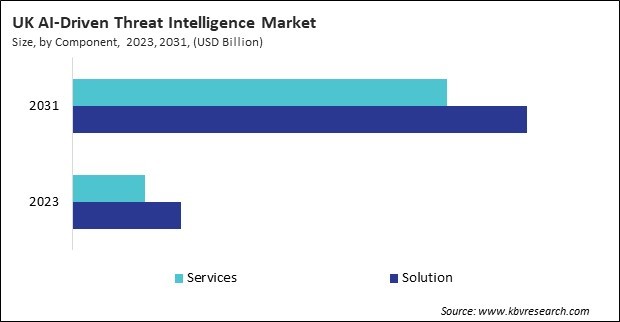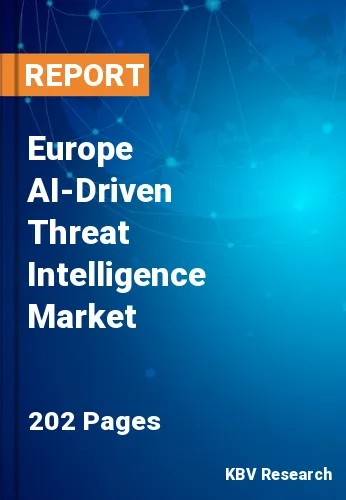The Europe AI-Driven Threat Intelligence Market would witness market growth of 22.8% CAGR during the forecast period (2024-2031).
The Germany market dominated the Europe AI-Driven Threat Intelligence Market by Country in 2023, and would continue to be a dominant market till 2031; thereby, achieving a market value of $1,513.7 million by 2031. The UK market is exhibiting a CAGR of 21.8% during (2024 - 2031). Additionally, The France market would witness a CAGR of 23.8% during (2024 - 2031).

At the core of AI-driven threat intelligence is the capacity of artificial intelligence to analyze enormous quantities of data at a pace that human analysts are unable to match. The modern cyber threat landscape is defined by the enormous data generation by digital systems, cloud platforms, IoT devices, social media, and other digital channels. This data continuously expands, creating an overwhelming challenge for traditional security teams that rely on manual processes and static rules-based systems to identify threats.
Integrating big data analytics and machine learning into threat intelligence allows AI-powered systems to sift through these massive datasets, identifying patterns, detecting anomalies, and uncovering potential threats with remarkable precision and speed. This continuous learning capability ensures that AI-driven threat intelligence remains adaptive and capable of evolving alongside the ever-changing tactics of cyber adversaries.
Germany, a leading industrial nation with a highly developed digital economy, is seeing a considerable rise in demand for AI-driven threat intelligence. The German Federal Office for Information Security (BSI) reported a marked increase in cyberattacks on critical infrastructure and industrial control systems in 2023. The BSI’s annual cyber security report, "BSI Lagebericht," highlighted the growing sophistication and frequency of ransomware attacks, particularly in sectors like healthcare, manufacturing, and finance. The German government has strengthened its cybersecurity framework and invested in advanced threat intelligence to protect national security and critical infrastructure. Consequently, the demand for threat intelligence is influenced by the increasing frequency of cyber threats, regulatory requirements, and the need to safeguard digital assets in European countries.
Free Valuable Insights: The Global AI-Driven Threat Intelligence Market will Hit USD 22.2 Billion by 2031, at a CAGR of 23.3%
Based on Deployment Mode, the market is segmented into Cloud, and On-premise. Based on Component, the market is segmented into Solution (Threat Intelligence Platforms, Security Information and Event Management (SIEM), Security Orchestration, Automation, and Response (SOAR), and Other Solution Type), and Services (Professional Service, Consulting, Managed Service, and Other Services Type). Based on Organization Size, the market is segmented into Large Enterprises, and Small & Medium-Sized Enterprises (SMEs). Based on Application, the market is segmented into Threat Detection, Risk Management, Security Operations, Incident Response, and Other Application. Based on Industry Vertical, the market is segmented into BFSI, Government & Defense, IT & Telecom, Healthcare & Lifesciences, Retail & eCommerce, Energy & Utilities, Manufacturing, and Other Industry Vertical. Based on countries, the market is segmented into Germany, UK, France, Russia, Spain, Italy, and Rest of Europe.
By Deployment Mode
By Component
By Organization Size
By Application
By Industry Vertical
By Country
Our team of dedicated experts can provide you with attractive expansion opportunities for your business.

